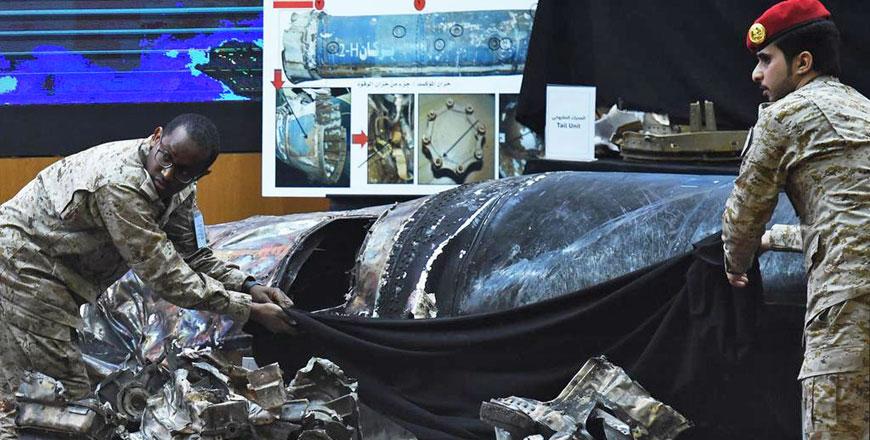You are here
UN panel finds further evidence of Iran link to Yemen missiles
By AFP - Aug 01,2018 - Last updated at Aug 01,2018

Saudi soldiers reveal the remains of missiles the Arab Coalition says are Iranian to the media at the Armed Forces Club in Riyadh on March 26 (AFP photo)
UNITED NATIONS, United States — Yemen’s Houthi rebels are still arming themselves with ballistic missiles and drones that “show characteristics similar” to Iranian-made weapons, a report by a UN panel of experts has found.
In a confidential report to the UN Security Council, a copy of which was seen by AFP on Monday, the panel said it “continues to believe” that short-range ballistic missiles and other weaponry were transferred from Iran to Yemen after an arms embargo was imposed in 2015.
Iran has repeatedly denied that it is arming the Houthis in Yemen, but the United States and Saudi Arabia have accused Tehran of providing military support to the rebels.
Recent inspections of weaponry including missiles and unmanned aerial vehicles (UAVs) used by the Houthis “show characteristics similar to weapons systems known to be produced in the Islamic Republic of Iran”, said the 125-page report.
During recent visits to Saudi Arabia, the panel was able to inspect debris from 10 missiles and found markings that suggest an Iranian origin, said the report spanning January to July this year.
“It seems that despite the targeted arms embargo, the Houthis continue to have access to ballistic missiles and UAVs to continue and possibly intensify their campaign against targets in KSA [Saudi Arabia],” said the report.
The panel said there was a “high probability” that the missiles were manufactured outside of Yemen, shipped in sections to the country and reassembled by the Houthis.
Iran denies backing Houthis
In a letter to the panel, Iran maintained that the missiles, which the Houthis have dubbed the Burkan, are a domestic upgrade of SCUD missiles that were part of Yemen’s arsenal before the start of the war.
The experts are also investigating information that the Houthis received from Iran a monthly donation of fuel valued at $30 million. Iran has denied providing any financial support to the Houthis.
During the inspections of the missile debris, the experts mandated by the council also found power converters produced by a Japanese company and Cyrillic markings on components that suggested a Russian link.
The investigation of those findings continues.
UN Secretary General Antonio Guterres told the council in a separate report in June that some components from five missiles fired at Saudi Arabia were manufactured in Iran, but that UN officials were unable to determine when they were shipped to Yemen.
The panel has opened an investigation of seven air strikes by the Saudi-led coalition that hit civilian buildings, a gas station and commercial vessels, in a possible violation of international humanitarian law.
The Houthis are accused of widespread and indiscriminate use of landmines.
Since 2015, Saudi Arabia has been leading a military campaign to push back the Houthis and restore the internationally recognised government to power.
The conflict has left nearly 10,000 people dead in Yemen, which the United Nations considers the world’s worst humanitarian crisis.
Related Articles
UNITED NATIONS — Two launch units for anti-tank guided missiles recovered by a Saudi-led military coalition in Yemen appear to have been man
UNITED NATIONS, United States — Iran has violated a UN arms embargo by failing to block supplies to Yemen's Houthi rebels of ballistic missi
UNITED NATIONS, United States — The UN Security Council will travel to Washington on Monday to inspect debris from missiles allegedly provid















